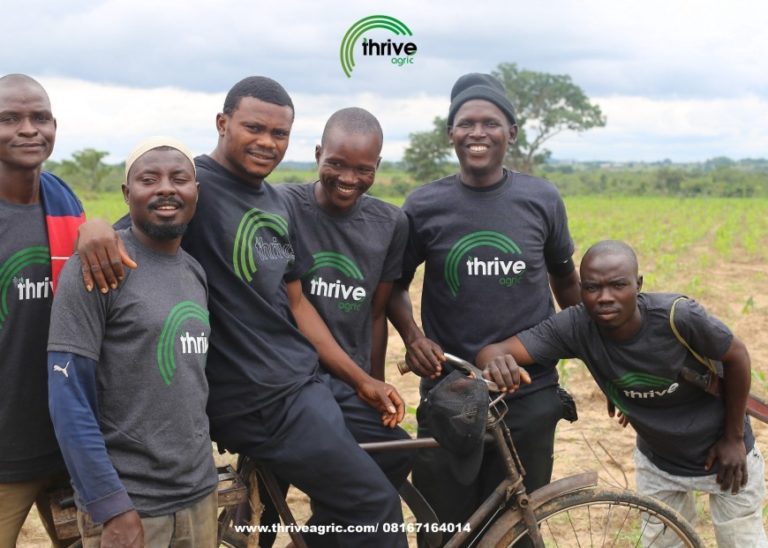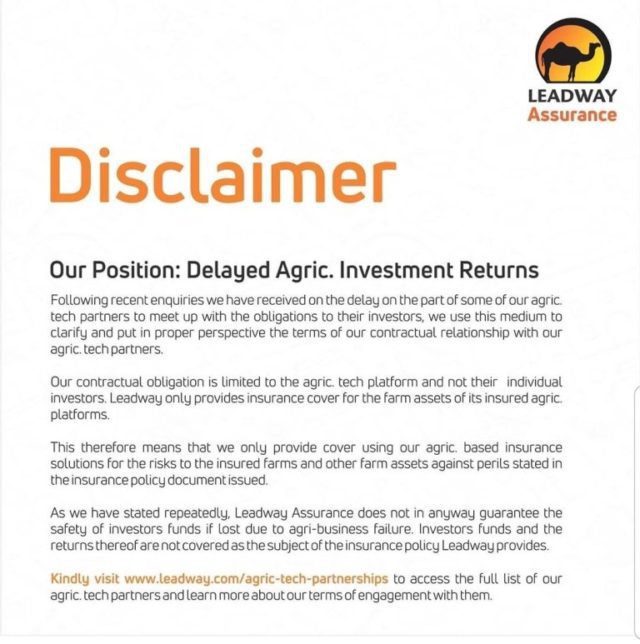Brand Matters
The Embattled Thrive Agric: Lessons and Thoughts -By Udeze Daniel Jr.
What’s the governance structures of some of these firms? What is their risk management capabilities and do they properly do end to end de-risking or just cover one end and stay optimistic that some ends will never leak? Its pretty tight and like I have said, this portends a huge risk and crisis to the entire crowdfunding/sourcing value chain.

Thrive Agric is an agricultural technology company that is helping solve the world’s biggest challenge by sustainably matching food production against a rising population. Thrive Agric’s primary revenue source is based on a successful harvest (inclusive of crops and poultry), founded by Uka Eje and Ayodeji Arikawe in 2017. It is an agricultural technology startup providing access to finance, premium markets, and data-driven advisory for smallholder farmers. Thrive Agric has gone ahead to fund over 15,000 farmers spread across 12 states in Nigeria.
Thrive Agric got selected to participate in the Google Developers Launchpad and was awarded the 2018 Young African Leaders Initiative (YALI) Leadership award in social enterprise by the Nigerian Mandela Washington Fellowship Alumni Association also during the Africa CEO summit last year. Thrive Agric was selected as one of the most promising Startups in Africa.

In 2019 Thrive Agric was selected by YCombinator during the Winter 2019 batch and the Go Global Africa fund of 2019.The CEO of Thrive Agric in May, in a mail sent to its subscribers, Thrive Agric blamed the COVID-19 pandemic, subsequent lockdowns, and offtakers for its struggles.
Additionally, subscribers would have to wait for not more than two years to receive their returns on investment. “Payments will be made in order of the maturity dates of the original farm subscription, but no more than 12/24 months in arrears. We say 12/24 months because it will take full farming seasons for the business to fully recover and we prefer to make a promise we can confidently keep,” an excerpt from the mail read.Facing more heat from subscribers after the outrageous news, the startup released a statement on Twitter. Eje and Ayo Arikawe, co-founders of the company, said the business was not fully prepared for the impact of the COVID-19 pandemic.In the circumstance, fund raising appears not to be the issue with this startup. If they had raised funds while clearly explaining the associated risks involved, restructuring the bond with more realistic returns will be more appropriate rather than seeking bail outs. Because, despite the pandemic, they should still have funds left to continue in the next or future farming seasons except of course there is a malfeasance.As government cannot bail out every failed business venture, least of all, unregulated crowd funded mishaps. This was not an equity investment wherein if business goes bad, everyone understands. It’s a partnership with shared risk.
Rather, this startup tied itself with the promise of a guaranteed investment return, which by the very nature of their business was unlikely to be sustainable.
Again, the sage holds true that a sand castle placed along the shore will ultimately give way to the waves.
Rebuilding such a castle will not change this phenomenon. Thus, whosoever offers a bail out will sooner or later need to do so again. A more sustainable solution is ensuring issues like this do not arise by putting in place sound regulatory mechanisms.Moreso, the model of funding adopted, which is that of promissory note for crowdfunding is a huge concern. This model would struggle to work perfectly in any AgriTech business due to the mean-variance nature of this business. Equity crowdfunding and other forms of equity finance remains the best source of raising funds.
Agriculture is a long term investment in nature, but belting your fund sourcing on farming cycle with outrageous ROI is a disaster in the waiting. Startups and founders really need to get to understand the best form of funding suitable for their projects. Promissory Note (Crowd debt) is not the best form funding method as we have seen. We hope the Agrictech startups and founders will rethink their funding model and strategy going into the future.On a more thorough analysis, one needs to understand the exact peculiar issue of Thrive Agric. Not having funds to pay is not the real issue. It’s the outcome of another thing.Payments can be restructured with the investors and the “guaranteed commitment” can also be reduced if it does not make sense to continue paying that initial return.
Restructure the payments, introduce a lock-up period (typical of PE firms investing) to enable the company restabilize and avoid people opting out immediately they agree to a restructure, and once stabilized, become more consistent with the payment of the renegotiated returns throughout the lock up period. After the lock up period, the desire to opt out of the scheme would have significantly dropped.
There is another option that could be explored but we need to first understand the real issue Thrive Agric is facing.
INSURANCE COMPANIES:
Insurance companies must be transparent and honest in mitigation of risk for which clients took Premium. No one expects them to insure investors fund.
However if they insured the farm to it’s right value, then investors capital should be protected and only the pledged profit should be affected, that is the essence of taking out an nsurance premium often.
My understanding of insurance and it’s policies appears to make me advise that it is not a system any business novice should patronize, especially in Nigeria. If Thrive Agric farm(s) got general insurance, inclusive of unavoidable risks of natural occurrence – like the pandemic, then these start-ups, should be assured of funds to continue the next farming cycle and investors should equally have nothing to worry about, as the pandemic made shift of very many projections. The insurance company disclaimer of not insuring investors fund is equivocal to “the farm was not insured” and therefore doesn’t cover the losses incurred due to activities before and after farming. In Thrive Agric’s case, this translates to a delay in getting produce to farmers and off-takers who didn’t pay up on time.However, what Leadway claims to cover is the activities from when farming commences. And if for instance, there’s mortality on the farm, Leadway will cover that.it doesn’t cover any of that if it’s as a result of the pandemic. Information on the insurance company’s website says, “Note that loss or damage to the insured crops or livestock or poultry or farms directly or indirectly attributable to or caused by the adverse consequences of the outbreak of the COVID-19 pandemic which in turn affects the management or operations of the farm is not covered by the policy.”
It is absurdly impossible to have these farms – without capital – which in this case came from (crowd), instead of creating a pandemonium, Leadway Assurance should be stating how much benefit they are paying out -to restart them – This, I believe is a reason for insurance.
WHAT NEXT?:
As investors continue to worry over the impossiblity of securing their returns, it will surely trigger shocks that will negatively impact most start-ups running the crowdfunding model.With poor regulations against forex, Crypto currencies and other high yielding Investment programs such as Ponzi schemes, these startups outdo themselves in an attempt to compete with some shady businesses that offer high returns.Truth remains that businesses with legitimate models cannot sustainably cope with such type of returns especially at the level of capacity accumulation.
Again, what’s the governance structures of some of these firms? What is their risk management capabilities and do they properly do end to end de-risking or just cover one end and stay optimistic that some ends will never leak? Its pretty tight and like I have said, this portends a huge risk and crisis to the entire crowdfunding/sourcing value chain.
It is our genuine hope that Thrive Agric recovers and recovers with lessons.
At the time of this piece, Thrive Agric has announced the appointment of an interim CEO – Adia Sowho as a replacement for Uka Eje.
Udeze writes from Lagos, Nigeria.arinzeudeze@ymail.com.



















